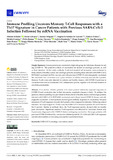Mostrar el registro sencillo del ítem
Immune profiling uncovers memory T-cell responses with a Th17 signature in cancer patients with previous SARS-CoV-2 infection followed by mRNA vaccination
| dc.creator | Echaide Górriz, Míriam | es_ES |
| dc.creator | Labiano, Ibone | es_ES |
| dc.creator | Delgado, Marina | es_ES |
| dc.creator | Fernández de Lascoiti, Ángela | es_ES |
| dc.creator | Ochoa, Patricia | es_ES |
| dc.creator | Garnica, Maider | es_ES |
| dc.creator | Ramos, Pablo | es_ES |
| dc.creator | Chocarro, Luisa | es_ES |
| dc.creator | Fernández Rubio, Leticia | es_ES |
| dc.creator | Arasanz Esteban, Hugo | es_ES |
| dc.creator | Bocanegra Gondán, Ana Isabel | es_ES |
| dc.creator | Blanco, Ester | es_ES |
| dc.creator | Piñeiro Hermida, Sergio | es_ES |
| dc.creator | Morente Sancho, Pilar | es_ES |
| dc.creator | Vera García, Ruth | es_ES |
| dc.creator | Alsina, María | es_ES |
| dc.creator | Escors Murugarren, David | es_ES |
| dc.creator | Kochan, Grazyna | es_ES |
| dc.date.accessioned | 2022-11-30T09:32:30Z | |
| dc.date.available | 2022-11-30T09:32:30Z | |
| dc.date.issued | 2022 | |
| dc.identifier.citation | Echaide, M., Labiano, I., Delgado, M., Fernández de Lascoiti, A., Ochoa, P., Garnica, M., Ramos, P., Chocarro, L., Fernández, L., Arasanz, H., Bocanegra, A., Blanco, E., Piñeiro-Hermida, S., Morente, P., Vera, R., Alsina, M., Escors, D., & Kochan, G. (2022). Immune profiling uncovers memory t-cell responses with a th17 signature in cancer patients with previous sars-cov-2 infection followed by mrna vaccination. Cancers, 14(18), 4464. | en |
| dc.identifier.issn | 2072-6694 | |
| dc.identifier.uri | https://hdl.handle.net/2454/44438 | |
| dc.description.abstract | It is unclear whether patients with cancer present inherently impaired responses to COVID-19 and vaccination due to their treatments, neoplastic diseases or both. To address this question, immune profiling was performed in three cohorts of healthy donors and oncologic patients: infected with SARS-CoV-2, BNT162b2-vaccinated, and with previous COVID-19 disease and subsequently vaccinated. Cancer patients showed good antibody responses to vaccination, but poor induction of T-cell responses towards the S protein when compared to infection. Following natural infection, the major targets for T-cells were the SARS-CoV-2 structural proteins M and S, but not the N protein. Similar to antibody titers, the T-cell responses quickly decayed after six months post-vaccination. Significant memory T-cell expansion was observed in vaccinated donors only if previously diagnosed with COVID-19 before undergoing vaccination. Oncologic patients with previous COVID-19 followed by vaccination exhibited potent IL-17+ CD4 and CD8 T-cell responses and elevated numbers of circulating neutrophils in peripheral blood. © 2022 by the authors. | en |
| dc.description.sponsorship | The OncoImmunology group is funded by the Spanish Association against Cancer (AECC, PROYE16001ESCO); Instituto de Salud Carlos III (ISCIII)-FEDER project grants (FIS PI17/02119, FIS PI20/00010, COV20/00000, and TRANSPOCART ICI19/00069); a Biomedicine Project grant from the Department of Health of the Government of Navarre (BMED 050-2019); Strategic projects from the Department of Industry, Government of Navarre (AGATA, Ref. 0011-1411-2020-000013; LINTERNA, Ref. 0011-1411-2020-000033; DESCARTHES, 0011-1411-2019-000058); Ministerio de Ciencia e Innovación (PID2019-108989RB-I00, PLEC2021-008094 MCIN/AEI/10.13039/501100011033). This project received funding from the European Union’s Horizon 2020 Research and Innovation Programme under grant agreement No. 848166. | en |
| dc.format.mimetype | application/pdf | en |
| dc.format.mimetype | application/zip | en |
| dc.language.iso | eng | en |
| dc.publisher | MDPI | en |
| dc.relation.ispartof | Cancers 2022, 14, 4464 | en |
| dc.rights | © 2022 by the authors. Licensee MDPI, Basel, Switzerland. This article is an open access article distributed under the terms and conditions of the Creative Commons Attribution (CC BY) license. | en |
| dc.rights.uri | http://creativecommons.org/licenses/by/4.0/ | |
| dc.subject | Cancer | en |
| dc.subject | Oncology | en |
| dc.subject | SARS-CoV-2 | en |
| dc.subject | Vaccination | en |
| dc.title | Immune profiling uncovers memory T-cell responses with a Th17 signature in cancer patients with previous SARS-CoV-2 infection followed by mRNA vaccination | en |
| dc.type | Artículo / Artikulua | es |
| dc.type | info:eu-repo/semantics/article | en |
| dc.date.updated | 2022-11-18T13:29:11Z | |
| dc.contributor.department | Ciencias de la Salud | es_ES |
| dc.contributor.department | Osasun Zientziak | eu |
| dc.rights.accessRights | Acceso abierto / Sarbide irekia | es |
| dc.rights.accessRights | info:eu-repo/semantics/openAccess | en |
| dc.identifier.doi | 10.3390/cancers14184464 | |
| dc.relation.projectID | info:eu-repo/grantAgreement/European Commission/Horizon 2020 Framework Programme/848166 | en |
| dc.relation.projectID | info:eu-repo/grantAgreement/AEI/Plan Estatal de Investigación Científica y Técnica y de Innovación 2017-2020/PID2019-108989RB-I00/ES/ | en |
| dc.relation.publisherversion | https://doi.org/10.3390/cancers14184464 | |
| dc.type.version | Versión publicada / Argitaratu den bertsioa | es |
| dc.type.version | info:eu-repo/semantics/publishedVersion | en |
| dc.contributor.funder | Gobierno de Navarra / Nafarroako Gobernua | es |



